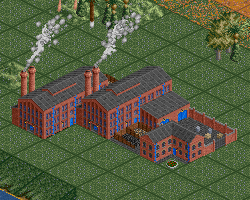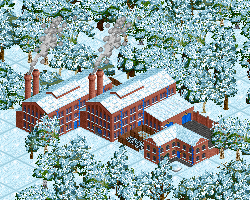ECS Basic Vector II. Glass works
| << ECS Basic Vector II. Sand pit | ECS Basic Vector II | ECS Basic Vector II. Brick works >> |
Valid for ECS 1.1
General data
Drawn by andythenorth, completely retextured and improved by George
The Glass works is the part of the ECS Basic Vector II.
Cargoes
Accepting
The Glass works accepts Sand, Coal, Potash (if defined).
The Glass works does not accept any cargo during first 93 days of life if built in game.
Cargo acceptance is limited by storage capacity. If the stockpile is in overflow, the industry stops accepting cargo until the stockpile is down to 75% of capacity, at which point the industry will start accepting cargo again.
| Level | Sand | Sand (75%) | Coal | Coal (75%) |
|---|---|---|---|---|
| Very low | 4367 | 3275 | 2320 | 1740 |
| Low | 5823 | 4367 | 3093 | 2320 |
| Normal | 7764 | 5823 | 4125 | 3093 |
| High | 10352 | 7764 | 5499 | 4125 |
| Very high | 13803 | 10352 | 7333 | 5499 |
| Ultimate | 18403 | 13803 | 9777 | 7333 |
Since 1.2 would be increased to
| Level | Sand | Sand (75%) | Coal | Coal (75%) |
|---|---|---|---|---|
| Very low | 6596 | 4947 | 3675 | 2756 |
| Low | 8245 | 6184 | 4594 | 3445 |
| Normal | 10306 | 7729 | 5742 | 4306 |
| High | 12882 | 9662 | 7177 | 5383 |
| Very high | 16103 | 12077 | 8972 | 6729 |
| Ultimate | 20129 | 15097 | 11215 | 8411 |
Acceptance limit can be disabled with parameter of ECS Basic Vector II
Production
The Glass works produces Glass.
The Glass works does not produce any cargo during first 93 days of life if built in game.
The Glass works uses 7 production levels, meaning number of furnaces being on (from 0 to 6).
Both cargoes are a must. On the lowest production level the missing cargo would be taken from internal resources, but only when the other cargo is transported to the industry. Glass works production is calculated from 6 furnaces. Initial values for furnaces are shown in the table (production data is calculated for 8 cycles a month. During game play, there are 8 or 9 cycles, while the total amount of distributed cargo is adjusted with property for minimal amount of cargo distributed).
Amount of material used is calculated as coal = 0.2 * glass, sand = 0.4 * glass.
Every furnace can be upgraded to the best one for the current date. The smallest furnace is upgraded first.
| Num\Year | 1920 | 1950 | 1975 | 2000 | 2020 | 2040 |
|---|---|---|---|---|---|---|
| 1 | 15 | 20 | 25 | 33 | 43 | 56 |
| 2 | 21 | 27 | 35 | 46 | 60 | 78 |
| 3 | 29 | 38 | 50 | 65 | 84 | 109 |
| 4 | 41 | 54 | 70 | 90 | 118 | 153 |
| 5 | 58 | 75 | 97 | 127 | 165 | 214 |
| 6 | 81 | 105 | 136 | 177 | 230 | 300 |
Production of glass:
| Level | Furnaces on | 1920 | 1950 | 1975 | 2000 | 2020 | 2040 |
|---|---|---|---|---|---|---|---|
| Very low | 1 | 120 | 156 | 203 | 264 | 343 | 446 |
| Low | 2 | 288 | 374 | 487 | 633 | 823 | 1069 |
| Normal | 3 | 523 | 680 | 884 | 1149 | 1494 | 1943 |
| High | 4 | 852 | 1108 | 1441 | 1873 | 2435 | 3165 |
| Very high | 5 | 1313 | 1708 | 2220 | 2886 | 3751 | 4877 |
| Ultimate | 6 | 1959 | 2547 | 3310 | 4304 | 5595 | 7273 |
| Limit | 6 | 3872 | 5034 | 6544 | 8508 | 11060 | 14378 |
- Limit means ultimate production level (6 furnaces are on) where all furnaces are upgraded.
Production change
Production change happens on the 1-st day of every month.
The Glass works does not change production level during first 93 days of life if built in game.
On the lowest production level advanced closure mechanism is applied with the following protection conditions:
- last one on the map
- younger than 5 years for industries, built in SE (scenario editor) or during map generation, younger than 2 years for others
- transportation level > 75%
Protection can be changed with parameter of ECS Basic Vector II to the following protection conditions:
- last one on the map
- younger than 5 years for industries, built in SE (scenario editor) or during map generation, younger than 2 years for others
- transportation level > 1%
- The Glass works was built by the player during game play
Changing production level is calculated by comparing the amount of cargo waiting and amount of material, required for production. If there is not enough cargo waiting, production changes. Industry can rise production by 1 level and decrease to any value.
Increasing production on high production levels also requires at least 50% of glass being transported.
Conditions for number of furnace going up
(Current production * 9.6 < Amount of sand stored) and (Current production * 4.8 < Amount of coal stored)
Conditions for number of furnace going down
(Current production * 3.2 > Amount of sand stored) or (Current production * 1.6 > Amount of coal stored)
Where Current production specifies amount of glass produced every 256 ticks.
Attention! If the industry is inside a town zone 2, it always generates a "decrease production" event.
Construction
The Glass works has one of 6 possible layouts. New layouts are welcome (:biggrin:)
The Glass works has normal probability (4) to be built by map generator and low probability (2) to be built during game play.
The Glass works can be built by a player both in a game and in the scenario editor. Construction cost factor is 152. Construction conditions are represented in the table.
When built by the player during a game, the Glass works will be in company colours of the builder. When generated by the game or built while in the scenario editor, the Glass works will pick up the colour randomly.
| SE | Condition |
|---|---|
| Build on dry land | |
| Build on flat land | |
| Build at least 16 tiles away from Tz0 | |
| Build > 16 tiles from a Sand pit | |
| Build > 16 tiles from a Coal mine | |
| Build > 8 tiles from a Glass works |
Description of Location/Positioning Conditions
Features
The Glass works is covered with snow when located above snow line. The Glass works supports company colours.

